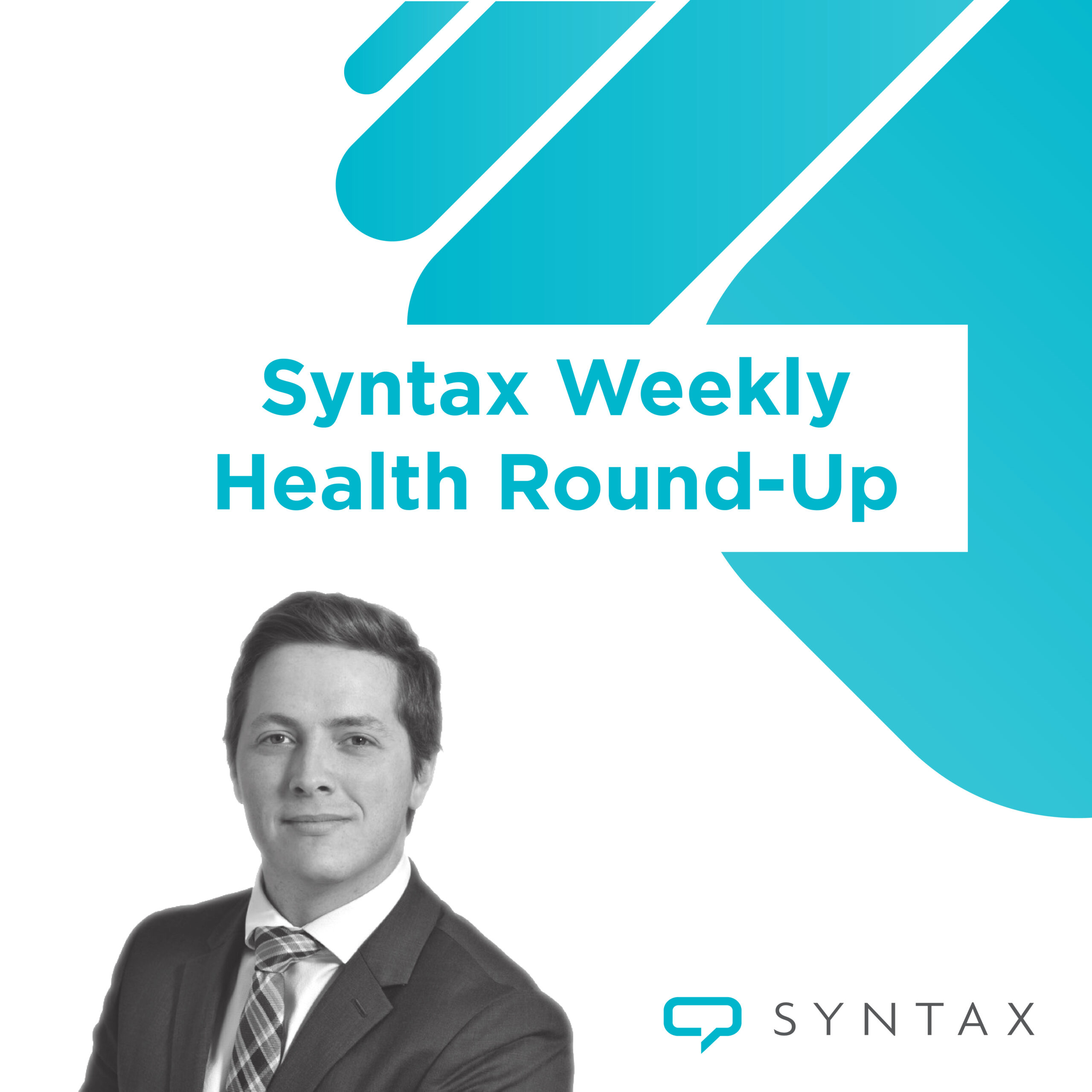Insights | Blog
Premier Houston Offers Cash for Ideas to Fix Nova Scotia’s Healthcare System
Minister Saks announces a renewed Canadian Drugs and Substances Strategy, and Nova Scotia announces the launch of YourHealthNS. On that, and more, here is your Syntax Weekly Health Round-Up.
On the Hill
- The House of Commons was the source of some ridicule this week, as decorum among MPs deteriorated even further with personal attacks and insults being hurled across the aisle and the Speaker losing control of the House at times. Canadians themselves are coming to see Question Period as rather useless. New data from the Angus Reid Institute found the top descriptive terms Canadians apply to debate in Parliament are “posturing” (54%), “useless” (46%), and “dishonest” (38%).
- The Standing Committee on Health met to discuss the Department of Health’s Regulatory changes for natural health products and received a briefing from the Minister of Health and Minister of Mental Health and Addictions on their mandate letters. During the latter, some Opposition MPs chose instead to grill the Ministers on housing and inflation. Discussion relevant to Minister Holland’s mandate letter included drug approval timelines, health workforce challenges, pandemic preparedness, health transfers, healthy eating, youth vaping, breast cancer screening, PMPRB consultations, and the cost of pharmacare. Discussion relevant to Minister Saks’ mandate letter included the opioid crisis and safe supply policies, safe consumption sites, youth mental health challenges, mental health transfers, the three-digit suicide prevention line, and medical assistance in dying.
Around Government
- Mental Health and Addictions Minister Ya’ara Saks released the renewed Canadian Drugs and Substances Strategy. The renewed strategy focuses on four foundational elements:
- Prevention and education: to prevent, reduce, or delay substance use;
- Services and supports: improving treatment, harm reduction, and recovery through regulatory or legislative actions (targeted amendments to the Controlled Drugs and Substances Act) with a focus on equitable access;
- Evidence: particularly regarding access to relevant, accurate, and reliable data to benefit future policy development; and
- Substance use services: authorizing legitimate public health activities such as clinical trials while giving law enforcement the tools needed to enhance public safety responses and address the harms of the illegal drug trade.
- Health Minister Mark Holland announced a $15-million investment to create a first-of-its-kind Pan-Canadian Genomic Library which will allow for easier sharing of genomic data across the country. The library will provide researchers and healthcare professionals with a centralized database that reflects the rich diversity of people living in Canada.
- Minister Holland also announced the launch of the Dementia Research and Innovation Funders Alliance to strengthen and advance dementia research in Canada. The alliance will bring together representatives of the brain health and dementia research funding community in Canada to align future research investments.
- Under the first-ever National Strategy for Drugs for Rare Diseases announced in March 2023, Minister Holland announced the creation of the Implementation Advisory Group (IAG) for drugs for rare diseases. The IAG will consult patients and stakeholders on patient-centered advice and best practices that will inform the implementation of the strategy.
- Minister of Families, Children and Social Development Jenna Sudds and Agriculture Minister Lawrence MacAulay released a What We Heard report summarizing feedback from consultations on a national school food policy. Over 5,200 Canadians contributed to the consultations leading to the report. The Ministers will now get to work on developing a national school food policy that is responsive to the evolving needs of children and families.
Around the Dominion
- The Government of Nova Scotia announced the launch of YourHealthNS, a one-stop shop to help residents better navigate the healthcare system. Through the app, residents can book services, navigate care, and find information more easily and quickly. Key features include the ability to book blood tests, X-rays, flu shots, and COVID-19 vaccine appointments, view predicted emergency department wait times, and access free, same-day virtual care.
- The Government of Ontario announced that it is lowering the eligibility age of self-referral for publicly funded mammograms through the Ontario Breast Screening Program from 50 to 40 beginning in fall 2024. The move is anticipated to help more than 305,000 people connect to breast cancer screening services sooner. The Government of Ontario also announced that as of October 30, flu shots and the most recent COVID-19 vaccines would be available free of charge for residents at local pharmacies, public health units, and primary healthcare providers.
- The Government of Saskatchewan asked the University of Saskatchewan’s College of Medicine to develop a new two-year Physician Assistant Master’s program to begin in fall 2025 and that it be specifically designed to meet critical needs in rural and remote areas. Physician assistants were recently introduced as a health profession in Saskatchewan for the first time.
- Alberta Minister of Mental Health and Addiction Dan Williams introduced Bill 3, the Opioid Damages and Health Care Costs Recovery Amendment Act, 2023, with the goal of strengthening Alberta’s position in class actions to recover opioid-related health care costs and other damages. The government announced it would invest any future damages awarded back to the province into supports for those suffering from mental health challenges or the deadly disease of addiction in their pursuit of recovery.

